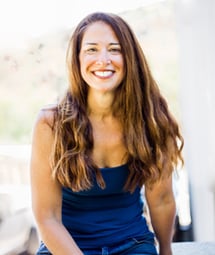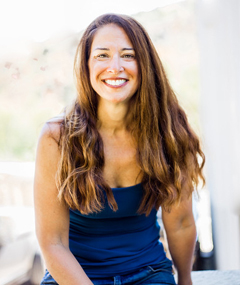Ten years ago, I found myself exhausted by trying to live up to everyone’s expectations. Attempting to live up to my own expectations drained me even more. On the outside, I appeared happy. Successful. Unflappable. On the inside, I felt anxious, disillusioned and tired.
While I hit my 40s running—literally and figuratively as I was an endurance athlete, working mother and dedicated volunteer—by 42, I wilted into someone I barely recognized. Not only was I worn-out, I had become resentful and sad. For the first time in my life, I felt unmoored.
Decades spent people pleasing, over-achieving and internalizing people’s words left me physically and emotionally sapped. I developed cysts on my breasts. My shoulder froze. By day, I lost my ability to speak up. By night, I woke up choking for air.
Many new mothers feel the tug between career and motherhood and I was no exception. While I never regretted the decision to leave my job to be a stay-at-home mom, I did experience overwhelming grief over the loss of my professional identity. For the first time in my adult life, I was no longer anchored, or defined, by my career.
Concurrently, I also began to feel emotionally disconnected from my peers in the picturesque, Vermont town where I lived. While I had a large social network and many friends, I wondered why as a woman and mother, I never felt safe exposing my weaknesses. The few times I did, I was met with disdain, judgment and condescension. I regretted sharing my stories the minute I told them. In my mind, I couldn’t stop thinking—Aren’t we the very women who should be supporting one another, not shaming each other?
The former researcher in me also wondered—Why is all of this happening?
And so what did I do?
I turned to journaling. At first, I didn’t give journaling much thought, since it had been a mainstay of mine since middle school. Soon, however, I realized that every time I wrote about my emotions, spilling them onto the page in whatever form they tumbled out, I felt happier. As a life-long writer, I remembered all of the times since childhood when I was called to my notebooks. I suddenly remembered— Journaling always made me feel better!
So I kept journaling. And journaling. And journaling.
The more I journaled—free from the fear of criticism or backlash—the more I started to find my voice again. The more I found my voice, the quicker I returned to myself. The more I returned to myself, the more joyous I became.
American author and speaker Charles Eisenstein writes about the space between stories, the time period when a person is transitioning from their old story into their new story. While I didn’t recognize it at the time, I was literally journaling myself into the next chapter of my life.
And so I kept journaling in order to better understand what I was thinking and feeling.
I journaled about all of the painful parts of my life, past and present. I journaled about my Holocaust survivor mother. My estranged father. My insensitive sisters. My bullish husband. My patrician friends. I journaled about how difficult it was to be raising a black daughter in white Vermont. I journaled about all of the dis-ease I was feeling amidst this money-oriented and status-conscious world.
I journaled about the struggles of trying to do it all, be it all. I journaled about not feeling (good) enough, not being (good) enough. I journaled, because I finally realized that I had the right to speak. I journaled, because I was tired of being silenced. I journaled like my life depended on it. Because at the time, in a way, it felt like it did.
I soaked many journals with tears, and later my laptop, too. However, the process of contextualizing and processing my feelings through journaling always improved my physical and emotional states.
And so the ex-researcher in me wondered again. If journaling held such positive effects for me individually, what would happen if this type of writing were done with other women in a supportive, compassionate, and non-toxic group setting? Intuitively, I believed I couldn’t possibly be the only 40-something craving this sort of shared intimacy in our technologically mediated, noisy world.
And so I journaled some more.
And I kept journaling, until I scribed my way into creating the Women’s Writing Circle (WWC), a safe, non-threatening space where women come together to free write and then share their stories out loud. Through journaling, I not only designed the space I had desperately craved for myself, I ended up creating a space that other women craved, as well! Within the next few years, hundreds of WWCs would be held in Vermont, Cambridge and Boston, and there are plans underway to expand the circles globally.
But that’s not all.
Since that time, I have literally journaled myself out of untold numbers of feeling states and into countless opportunities. I journaled through my parents deaths; they died just 9 weeks apart. I journaled myself into a gratitude mindfulness practice and back to Judaism. I journaled outside a graduate testing center, because I read that free writing before a test can improve one’s score (and it did!). I even journaled my way into a PhD program, something I never envisioned when I had been in-between stories years ago.
And that brings us to today and the global pandemic. This past Spring, sequestered in my home like so many others, I kept asking myself—How can I best be in service? Once again, I turned to journaling for the answer. And once again, journaling gave me clarity, along with the conviction to launch The Journal of Expressive Writing, the first literary journal to publish expressive writing from a writing prompt. Today, only five months after débuting the journal, I have published the voices of over 100 new and established American and International writers. Their stories needed to be heard, just as mine had so many years ago, and now they are.
To me, this is the power of journaling!
 Author bio: Jennifer A. Minotti is a Writer-in-Residence at the Center for Women’s Health and Human Rights at Suffolk University and a PhD student at Lesley University. She is the founder of the Women’s Writing Circle and the Journal of Expressive Writing. She is the Co-Creator of the World’s Very First Gratitude Parade, and helped establish Gratitude Day in the City of Cambridge, MA. For 17 years, Jen worked at the Education Development Center, Inc. (EDC) in a variety of technology, research, writing, and leadership roles for projects focused on education, health, and human development.
Author bio: Jennifer A. Minotti is a Writer-in-Residence at the Center for Women’s Health and Human Rights at Suffolk University and a PhD student at Lesley University. She is the founder of the Women’s Writing Circle and the Journal of Expressive Writing. She is the Co-Creator of the World’s Very First Gratitude Parade, and helped establish Gratitude Day in the City of Cambridge, MA. For 17 years, Jen worked at the Education Development Center, Inc. (EDC) in a variety of technology, research, writing, and leadership roles for projects focused on education, health, and human development.
Jen is a graduate of Boston University (B.S.) and Columbia University (M.A., M.Ed.) and holds certificates in Wholebeing Positive Psychology, Transformational Language Arts, Distance Education, and Herbal Studies. She is currently studying to be a Transition Writing Specialist and Journal Therapy Facilitator, as she is passionate about spreading the benefits of expressive writing and journaling with others. In her free time, she is a dedicated mindfulness practitioner of gratitude, which you can read about on her Gratitude Jar website.
You can find Jen journaling in Cambridge, MA, where she lives with her husband and two teenage children.


Leave Comment